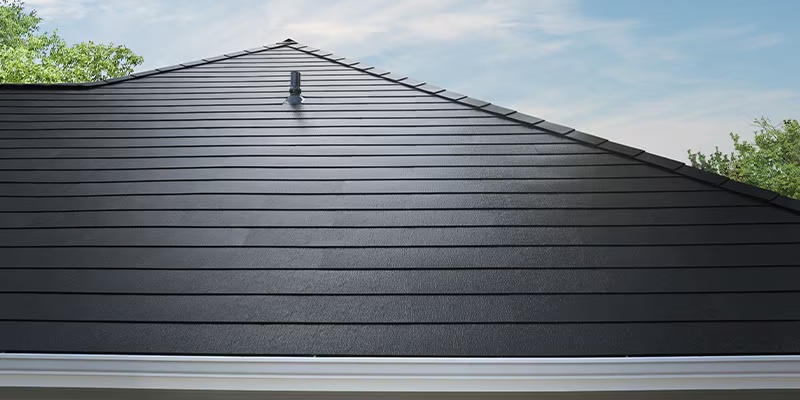Roofing decisions in Colorado carry more weight than in most states because the climate does not give materials a break. What works fine in milder regions fails faster here, and choosing the wrong system means dealing with repairs, leaks, or premature replacement years before you planned for it.
Metal roofing has gained traction among Colorado homeowners over the past decade, driven by its reputation for handling hail, shedding snow, and lasting much longer than asphalt shingles. But metal roofs are not universal solutions—they cost more upfront, require specialized installation, and come with considerations around noise and thermal movement that matter more here than elsewhere. Before committing to metal or sticking with traditional materials, it helps to look at how Colorado’s weather actually tests roofing systems and whether a metal roof’s advantages line up with what your home faces year after year.
Colorado’s Climate: What It Means for Your Home & Roof
Colorado’s weather does not fit neatly into categories. A single day can swing from freezing mornings to warm afternoons, then back to below freezing by evening. Hailstorms arrive with little warning during spring and summer, dropping stones large enough to shatter windshields and punch through roofing materials. Winter brings heavy snow to mountain areas and the Front Range, while intense UV radiation at high elevation beats down year-round, degrading roofing materials faster than in states at lower elevations.
Wind events—from Chinook gusts along the foothills to mountain downslope flows—can exceed 100 mph in some areas. These are not occasional extremes. They are routine conditions that every Colorado home must handle season after season, and they explain why roofing materials, lifespans, and maintenance needs here differ substantially from national averages.
Pros & Cons of Metal Roofs in Colorado
Metal roofing offers clear advantages in Colorado’s climate, but also comes with trade-offs that affect upfront cost, installation complexity, and long-term performance.
Pros of Metal Roofs in Colorado
Durability in hail, snow, and wind: Impact-resistant metal panels withstand hail better than most roofing materials, particularly when rated Class 4 for impact resistance. Metal roofing sheds snow efficiently due to its smooth surface and low friction, reducing accumulated weight and ice dam formation. Interlocking panel systems and proper fastening resist wind uplift, critical in areas prone to high winds and gusts.
Energy efficiency potential: Reflective metal surfaces reduce heat absorption during summer months, lowering cooling costs compared to darker asphalt shingles. Some metal roofing products feature specialized coatings that reflect UV radiation and minimize heat transfer into attic spaces. In winter, metal roofing works with proper insulation to help maintain stable indoor temperatures during Colorado’s rapid weather changes.
Longevity: Metal roofs typically last 40-70 years in Colorado with proper installation and maintenance, significantly outlasting asphalt shingles that average 15-25 years in the state’s harsh climate. This extended service life means fewer replacements over the home’s lifetime, reducing long-term costs despite higher initial investment.
Sustainability: Metal roofing is often made from recycled content and remains fully recyclable at the end of its service life, unlike asphalt shingles that typically end up in landfills. The extended lifespan reduces replacement frequency and associated material waste, making metal a more sustainable choice over decades of use.
Fire resistance: Metal roofing is non-combustible and carries Class A fire ratings, the highest available. In Colorado areas prone to wildfires or where fire safety is a priority, this protection offers peace of mind and may qualify for insurance discounts.
GAF TimberSteel metal roofing combines these performance benefits with architectural profiles that mimic traditional roofing materials, offering durability without sacrificing curb appeal.
Cons of Metal Roofs in Colorado
Upfront cost: Metal roofing systems cost more initially than asphalt shingles—often two to three times as much depending on product and installation complexity. However, the extended service life, reduced maintenance requirements, and potential energy savings can offset higher initial costs over the roof’s lifetime. For homeowners planning to stay in their home long-term, the total cost of ownership may favor metal despite the larger upfront investment.
Sound during storms: Metal roofing can transmit more sound during rain or hail compared to asphalt shingles, though the difference is often overstated. Quality underlayment, solid roof decking (not skip sheathing), and adequate attic insulation dramatically reduce sound transmission. Most homeowners with professionally installed metal roofs report minimal noise concerns, but those sensitive to sound should consider this factor.
Thermal movement: Metal expands when heated and contracts when cooled. Colorado’s temperature swings—sometimes exceeding 40°F in a single day—create continuous expansion and contraction cycles. Improper fastening or inadequate allowance for movement can cause fasteners to loosen, panels to buckle, or seams to separate over time. Professional installation with appropriate fastening systems, expansion clips where needed, and quality underlayment manages this movement and preserves long-term performance.
Installation complexity: Metal roofing requires specialized knowledge, tools, and techniques. Not all roofing contractors have experience with metal systems, and improper installation voids warranties and compromises performance. Finding qualified installers and ensuring work meets manufacturer specifications is critical.
Denting potential: While metal roofs resist hail better than asphalt shingles, large hailstones can still dent panels, particularly on softer metals like aluminum or copper. Steel roofing with appropriate thickness and protective coatings offers better dent resistance. Cosmetic denting does not typically affect functionality but may be visible depending on roof pitch and viewing angle.
With high-grade products like GAF TimberSteel and professional installation, these concerns are addressed effectively to deliver reliable protection suited to Colorado’s UV exposure, wind, freeze-thaw cycles, and hail risk.
Maintenance and Expected Service Life
Metal roofs need less maintenance than asphalt shingles but are not maintenance-free. Annual inspections keep them performing well for decades.
Check fasteners after severe weather—Colorado’s temperature swings can loosen them over time. Inspect and reapply sealant around vents, chimneys, and skylights as UV exposure degrades it. Clear debris from valleys and roof surfaces where leaves and branches trap moisture that can cause corrosion. Keep gutters clean so water drains properly and does not back up under panels during freeze-thaw cycles.
After hailstorms, inspect for dents or coating damage. Touch up scratches with manufacturer-approved products to prevent corrosion. Check panel seams stay secure and look for any buckling that signals fastening issues.
Metal roofs in Colorado commonly last 40-70 years with proper installation and maintenance. Steel roofing with quality coatings resists corrosion throughout its service life. Aluminum offers natural corrosion resistance and often exceeds 50 years. Premium systems like GAF TimberSteel handle Colorado’s UV exposure, hail, wind, and temperature extremes reliably. Compared to asphalt shingles that last 15-25 years here, metal roofs deliver two to three times the longevity.
How to Decide What Fits Your Home
Choosing the right roofing system starts with your specific situation—how often hail hits your neighborhood, how much snow piles up in winter, what kind of wind exposure your property faces, and how intense UV radiation is at your elevation. Your home’s insulation and ventilation setup, roof slope, architectural style, and whether the structure can handle heavier materials all play into which option makes the most sense for long-term performance.
GAF TimberSteel metal roofing tackles Colorado’s conditions head-on. The steel construction takes hail hits better than asphalt shingles, with Class 4 impact ratings available that can lower your insurance premiums. Snow slides off the smooth surface instead of sitting there and compacting into heavy ice, which cuts down on the load your roof carries and reduces ice dam problems that cause leaks on traditional roofs. The interlocking panels and fastening system hold up against wind—important along the Front Range and in the mountains where gusts regularly hit 60 mph or higher. Protective coatings bounce UV radiation back instead of absorbing it, which stops the rapid breakdown that cuts asphalt shingle life short at Colorado’s elevations.
TimberSteel also looks the part. It mimics wood shake with dimensional profiles and shadow lines that read as natural material from the street, available in colors that work with everything from mountain lodges to modern builds. You get metal roof performance without the industrial appearance some homeowners want to avoid.
Installation quality makes or breaks metal roofs. DaBella’s crew evaluates your roof structure, pitch, and layout to spec the right TimberSteel setup and accessories for your home. Correct installation handles thermal movement through proper fastening and expansion allowances, seals penetrations and transitions against water, and anchors everything to meet Colorado’s wind and snow requirements. The GAF Golden Pledge Warranty—only available through Master Elite contractors like DaBella—covers both materials and labor for full protection.
TimberSteel metal roofs pay off over time in several ways. Reflective coatings cut cooling costs in summer. You skip the ongoing maintenance that asphalt shingles demand—no replacing storm-damaged pieces, no worrying about granule loss or algae streaks. Fire resistance adds safety and may trim insurance costs. Full recyclability at the end of lifespan keeps materials out of landfills. For Colorado homeowners weighing options, TimberSteel combines durability, performance, and curb appeal in a package built for the climate.
FAQs: Metal Roofs in Colorado
Questions Colorado homeowners typically have about metal roofing:
Does a metal roof affect homeowners’ insurance?
Many insurers view high-quality metal roofs as lower risk due to their resistance to hail, wind, and fire. This perception can lead to premium discounts or more favorable policy terms, though specifics vary by carrier, coverage type, and the metal roofing product installed. Impact-rated metal roofing may qualify for additional discounts in hail-prone areas. Contact your insurance provider to confirm eligibility requirements and what documentation they need—such as product specifications, impact ratings, or installation certifications—to apply for any available discounts.
What are the two biggest concerns for a metal roof?
The primary concerns are thermal movement and noise. Metal expands and contracts with temperature changes, and Colorado’s dramatic temperature swings—sometimes 40°F or more in a single day—can stress fasteners and panels if the system is not designed to accommodate movement. Professional installation with proper fastening systems, expansion clips, and quality underlayment addresses this issue by allowing panels to move without compromising the roof’s integrity. Noise during heavy rain or hail is the second concern, though it is often overstated. Adequate attic insulation, solid roof decking, and quality underlayment significantly reduce sound transmission, making metal roofs no louder than other materials in most cases.
How long does a metal roof last in Colorado?
With quality materials and professional installation, metal roofs commonly last 40–70 years in Colorado. Premium systems are engineered to perform across high UV exposure, hail impact, wind uplift, and freeze-thaw conditions for decades. Steel roofing with protective coatings resists corrosion and maintains appearance over time. Aluminum roofing offers natural corrosion resistance, particularly valuable in areas with moisture exposure.
Choose DaBella for Your Colorado Roof Replacement
DaBella is proud to hold GAF Master Elite certification, a distinction earned by fewer than two percent of roofing contractors nationwide. This designation reflects our commitment to training, quality craftsmanship, and customer satisfaction—standards that directly impact how well your roof performs in Colorado’s demanding climate.
We install GAF roofing systems designed to fit diverse needs and budgets. The GAF TimberSteel metal roofing system provides exceptional durability, lasting 40 to 70 years with superior hail resistance and energy efficiency for homeowners seeking long-term value. The Timberline HDZ asphalt shingle line delivers reliable performance and curb appeal at a lower upfront cost, while the ArmorShield impact-resistant shingles offer Class 4 hail protection—the highest rating available—ideal for homes across Colorado’s hail-prone regions.
Every installation includes the option for GAF’s Golden Pledge Warranty, which covers both materials and workmanship and is backed by one of the industry’s leading manufacturers. We also provide flexible financing options, making it easier to invest in a premium roof without compromising on quality or performance.
If you are ready to take the next step, contact us today at 844-DaBella to schedule your free consultation. Our team will inspect your roof, discuss your priorities, explain the advantages of each system, and create a detailed proposal tailored to your home and budget. Let us help you find the right roofing solution for Colorado’s climate.

